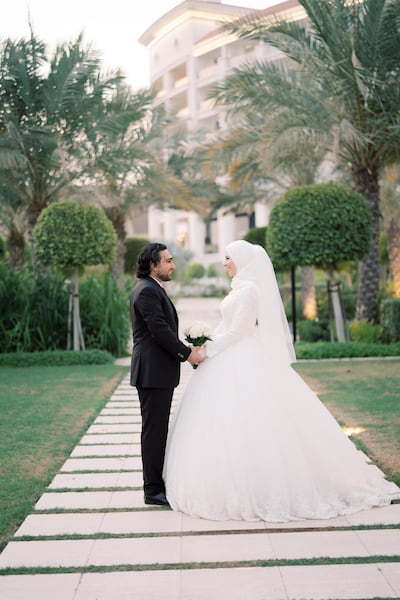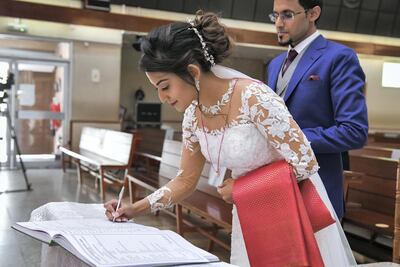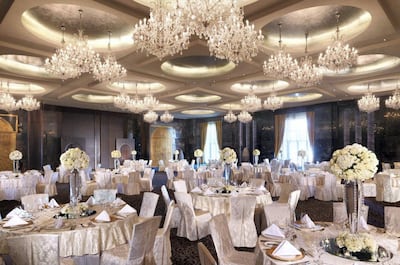This year has been a tough one for events in general, and planning a wedding has come with its own special dose of co-ordination, confusion and chaos.
As the pandemic rages on around the world, couples have had to make some important decisions. Big ceremonies have had to be postponed, replanned and then cancelled, while the meticulous facilitation of everything from the guest list to the location have gone to waste. As many have lamented, this situation is every prospective bride and groom’s worst nightmare.
But it's human nature to adapt and there is always light at the end of the tunnel. In the UAE, depending on the emirate, weddings are possible as long as they are Zoom ceremonies or simple, intimate functions that follow all government protocols and social-distancing measures.
Maybe Covid-19 has stripped weddings down to what matters most: a celebration of love with the people closest to the couple. The trend looks set to continue into next year.
Small weddings: the next big trend?
Rhiannon Downie-Hurst, founder of the wedding inspiration website and concierge service Brideclubme.com, says weddings will be more local and personalised in the months to come. For those planning a wedding during the pandemic, the first and most obvious change is downsizing the number of guests.
"We have seen a sharp increase in inquiries for wedding gatherings with 15 to 100 guests," says Downie-Hurst. "Wedding planners are going to have to be creative in the way that they propose set-ups." Just because the wedding is small, doesn't mean it can't be special. Downie-Hurst points out that smaller weddings have led to a rise in "experiential" weddings.
“Outdoor weddings are more popular than ever. Budgets may change, but with weddings downsizing, couples will be spending more on the finer details, like personalisation, within Covid-19 health and safety guidelines.”

Scaling down your guest list has other benefits, too, says stylist and florist Joelle Clute, owner of planning service My Lovely Wedding. “You’ll spend less overall. Moreover, having 50 guests rather than 200 means you can make it really personal, for example, with the stationery, the food and beverage packages, a smaller venue.
"It means you’re only surrounded by your favourite people and it’s a true celebration of love. Speaking from experience, it’s quite hard to make a wedding personal with more than 200 to 300 guests,” she says.
To postpone or downsize?
Abu Dhabi resident Anand Pious was meant to get married in May this year in a ceremony in India with 1,500 guests in attendance. However, because of the onset of the pandemic and travel restrictions, Pious and his partner, Anu Francis, postponed the wedding to September. When September arrived, they decided to scrap the plan entirely – and had a small church ceremony with only 10 people.
Choosing between postponing the wedding or going ahead with a small function was a tough call, says Pious, but what clinched the decision was the lack of certainty, even if they were to wait. "The thought of postponing yet again did cross our minds, but there was no guarantee that things would calm down in the next few months, or even next year."
The couple approached the church that helped with approvals to ensure they were in line with government regulations. Some members of the family weren’t able to fly in as they were stuck in other countries and constraints on the number of people meant the couple didn’t have room for a photographer, either.

The two did manage to find a way around that, though. With Pious and his brother being photography enthusiasts, they had a live stream set up inside the church. Pictures were taken with the use of triggers operated from outside the church, with Pious's brother Arun overseeing the process. It all made for a very unique wedding experience, says the groom.
“It may not have been the kind of ceremony we'd always dreamed of, but we really enjoyed it and everything went off without a hitch. I think if people have been waiting for a while to get married, they might as well do it. Just focus on making it memorable for the both of you, don’t worry about the rest of the world.”
Get your date booked: 2021 set to be a busy year
For those planning to postpone their wedding, experts recommend fixing a new date as soon as possible. “With so many weddings being cancelled and postponed, 2021 – if things improve and restrictions are lifted – is going to be very busy. To avoid disappointment, couples should be locking down their dates now and confirming suppliers, as many will have already moved their clients to next year,” says Downie-Hurst.
Zeynep Oden Agagil, cluster commercial director for Raffles Dubai and Sofitel Dubai The Obelisk, says 85 per cent of weddings booked this year have been shifted to 2021. "The upcoming year will have a higher demand and venue availability might be limited. Hence, we encourage couples to keep a security deposit with the venue and block tentative dates as this guarantees that the venue remains dedicated for the couple while giving them the flexibility to change their dates."
Before putting in deposits, however, it’s important to do your homework and find about the vendor’s refund policy. “Most vendors are flexible, but it does vary,” says Clute. “And be prepared to change the date. I think being flexible and open-minded will help in the long run. We are all going through this together and no one knows what the situation will be like in six months.”

One of the most important things to look out for when planning a wedding during the pandemic is safety. Downie-Hurst says every vendor, from planners and caterers to florists, should be able to inform clients how they are keeping safe. Agagil adds there has been an increase in demand for site inspections from guests over the past few months.
“There has also been demand for real-time virtual technology and live-streaming facilities.” Even the decor, she says, should be minimalist to discourage people from coming into contact with potentially contaminated surfaces. She recommends keeping things simple and finding an event organiser who is updated with the current government regulations so as to ensure the ceremony does not violate any of them.
Remember, it’s about the marriage, not the wedding

If it all gets too overwhelming, Downie-Hurst suggests keeping in mind why you’re getting married to get a sense of perspective. “If all else fails, get legally married and plan a celebration when it is safe and you are able to do so. I know it is hard, especially for those who have envisioned their big day for years, but what really matters is your health and the fact that you are marrying the one you love,” she says.
UAE resident Sally Attar agrees. She and her fiance, Aoun Assaad, had planned their dream ceremony for March, which they later pushed to June. When they weren't able to pull off a June wedding, either, they decided to go ahead in a different way. "We both work at a school, we were off for summer. What were we waiting for?" she says. "We ended up having a Zoom function."
After the official ceremony was over, Attar and Assaad had a wedding photo shoot (complete with “I do” face masks) and later celebrated with an intimate family dinner out. “I honestly don’t feel like I missed out,” she says.
The couple had already put in deposits for a venue and other aspects of their wedding, which is why they still plan on throwing a bigger bash next year. "But honestly, I wouldn't be disappointed if that didn't happen," she adds. "I feel fulfilled with what we had."
To those planning to tie the knot, she says just go ahead, even it's not the big, flashy ceremony you once imagined. "Don't put your life plans on hold. Just enjoy the experience and live the moment. When you look back, you will remember this as a unique experience. Embrace it rather than seeing it as a setback."




